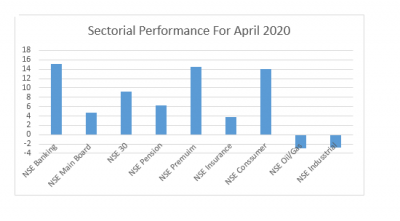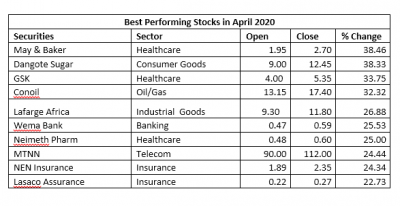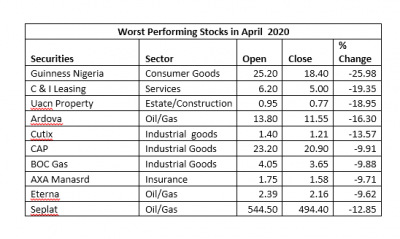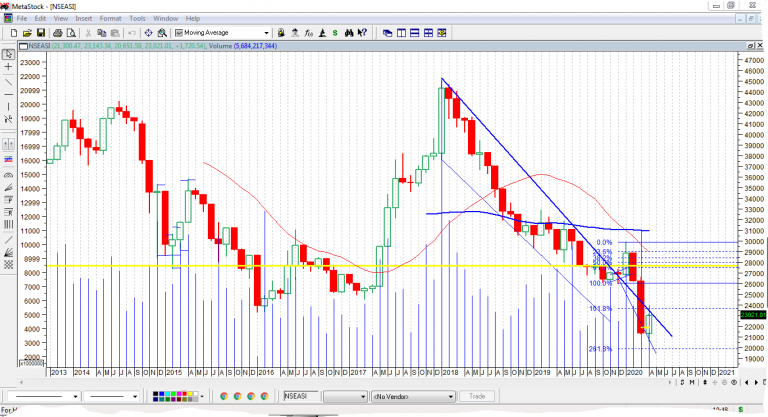Market Roundup for April 2020
At the close of Thursday trading, the Nigerian Stock Exchange (NSE) sustained its positive trend and sentiment, closing the first month in 2020 second quarter on a positive note, despite the lockdown of the economy owing to the Coronavirus (COVID-19) pandemic ravaging many countries of the world, with incidences of new cases rising daily in Nigeria.
The NSE All-Share index, therefore, halted the bear-run seen in the preceding two months, due to seeming market corrections, after the market had suffered huge losses in the month of March. Recall that during the month of March, the NSEASI touched its 11-year low, just as crude oil prices crashed to a 21-year low at the international market.
The rebound in the NSEASI continues to confound many analysts and market watchers, judging by the sharp divergence between the index’s performance and economic realities as shown in the latest reports of the World Bank and International Monetary Fund (IMF) that the Nigerian economy will slip into recession, with a negative growth of 3.4% this year (READ MORE).
The NSE’s key performance index, over the period, recovered 8.08% from the earlier recorded year-to-date loss of 23.06%, before the recovery move that closed April higher, reducing NSE YTD loss position to 14.24%.
The ‘V’ shape recovery recorded in April as the index formed a cup and handle chart pattern followed the low price attraction, the high inflow of smart money, and investor expectations of the 2019 full-year and Q1 2020 earnings reports during the month. These rekindle bargain hunting among traders and investors with increased buying interest at a time prices of many equities were trading at discount irrespective of the challenging economic situation that is sliding into recession as signaled by macro-economic indicators in the domestic and global economy.
However, Investdata believes that the NSE’s rebound in April was beyond investors’ hunger for undervalued stocks or even the earnings expectations. We believe the rebound points to a renewed interest and return of foreign investors who had sold their positions earlier but encountered problems at the Central Bank of Nigeria’s Investors & Exporters window of the foreign exchange market.
This was a strong market fundamental that drove stock prices during the period under review, added to the hope of a bailout package by government, as well as the complementary efforts of CBN, through its intervention funds for critical sectors and small scale businesses totaling N3.5tr. These are aimed at mitigating the multiplier effects of the COVID-19 lockdown and are expected to go a long way, if the funds get to the target and boost local productivity, therefore sustaining jobs and creating more at this time. The interventions and ensuring that they work as designed has become necessary, given the fact that the Nigerian economy was already struggling before the onset of Covid-19, and indeed over the last five years.
Nigeria’s 2020 budget has been reviewed downward due to so many uncertainties arising from low oil prices, the nation’s high debt profile, low revenue, worrisome insecurity level, lack of structural economic reforms, and a sociopolitical direction.
Meanwhile, in the 20-trading sessions of April, which was entirely from remote platforms, following the shutdown of the trading floor due to the Covid-19 shutdown in Lagos (just like Ogun and Abuja), the composite NSE index oscillated and closed higher. The index recorded 14 trading days of upmarket and six sessions of decline during the period.
Specifically, the composite NSEASI for the month of April gained 1,720.54 basis points to close at 23,021.47bp, after it broke out the 22,000 and 23,000 psychological levels from an opening figure of 21,300.47bp, representing 8.1% growth.
The buying volume of total transactions for the month was 95%, while selling position was 5%, halting previous months’ down market as volume index for the period was 0.78. Market capitalization for the month rose by N896.66bn to close at N11.997tr, from an opening value of N11.1tr, representing 8.08% appreciation in value, with the market witnessing mixed sentiments and reactions to the 2019 audited financials and unaudited 2020Q1 scorecards. Transaction volume during the month dropped by 48.18%, as investors traded 5.68bn shares, compared to the previous 10.96bn units.
The NSEASI’s year-to-date loss stood at 14.24%, just as that of market capitalisation adjusted down to N960.91bn, representing 7.42% loss YTD from the opening value.
Market breadth for April was positive as advancers outpaced decliners in the ratio of 52:22, thereby short-living the bear transition, despite the gloomy economy, mixed sentiment, and the low number of quoted companies with December year-end that had released their 2019 financials and first-quarter earnings reports. The earnings reports were nonetheless mixed but mostly higher than market expectations, especially as was the case of a few stocks in the banking, agri-business, consumer goods, and telecommunication, which helped the financial service providers and others to emerge among the best performing on the April chart.
The sectoral performance chart below shows that banking propelled the market the most in the period under review after gaining 15.14%, compared to the 8.1% rally recorded by the benchmark NSE All-Share Index. It was followed by the NSE Premium Board which rose by 14.34%, reflecting the confidence investors reposed in such stocks, besides acknowledging their resilience over the years, in addition to the impact of recovery in the price of telecommunication giant, MTN Nigeria. This was followed by the NSE Consumer Goods index, which jumped 14.02% up during the month, arising from their low price attractions, after they had suffered huge losses over the years. There was also the impact of the low Price-To-Earnings attraction in the sectors, which also helped indexes like NSE 50 Index, NSE 30, NSE Pension and NSE Insurance to close in green. On the flip side, the NSE Oil/Gas led by 2.84%; followed by NSE Industrial Goods with 2.75%.

Best Performing Stocks for April
The month’s best performer was May & Baker, one of the major companies poised to benefit from the special N50bn package set aside by the CBN to help indigenous pharmaceutical companies remain in business and eventually help Nigeria’s journey towards self-sufficiency in the production of medicines post-pandemic. Investors are also still expecting M&B’s 2019 full-year result any moment from now and positioning, especially given its dividend payment history before now. The share price of M&B closed up by a significant 38.46% in the month of April, compared to its opening price; followed by Dangote Sugar, which chalked 38.33%; while GSK, another pharmaceutical giant grabbed 33.75%; and Conoil, 32.32%.
Overall, companies at the top gainers of April’s gainers’ table included: Lafarge Africa 26.88%; and MTNN, 24.44%; among others.

Worst Performing Stocks for April
The top laggard was Guinness Nigeria, which lost 25.98% on it unimpressive performance as revealed by the latest numbers, market forces, and prevailing economic situation; it was followed by C&I Leasing which shed 19.35%; UACN Property, 18.95%; Ardova (Former Forte Oil), 16.30%; and Cutix, 13.57%; on the back of weak sentiment and numbers after the bonus share and proposed acquisition of Adswitch.

Technical View on Monthly Time Frame
The NSE’s index action has remained technically on a downtrend in a bearish channel for over three years, touching an 11-year low before attempting to rebound in the midst of mixed sentiments and trade pattern as market fundamentals look weak. The inflow to equity assets as revealed by the money flow index supported the seeming reversal on smart money portfolio repositioning.
Where To Invest And ExpectationsFor May, June
The global economy and market remain dicey and gloomy, as seen in the recent World Bank downgrade of the global economic growth outlook on the back of the havoc being wreaked by coronavirus pandemic. This is amidst mounting concerns by governments and investors over the oncoming global recession or depression which can easily destroy investments, due to low oil prices, dwindling resources, and confidence.
Back home, the wobbling economic situation and reality will continue in the new month as we expect more economic data and events to confirm the real wellbeing of the nation, especially as the downward review of the benchmark oil price for the 2020 budget to $30 from $57 points to the fact that all is not well with the nation’s economy at a time oil remain the major source of revenue for budget financing.
With the debt reliefs here and there, grants and borrowing to support the revenue shortage and enable government implement its budget, as well as intervene to mitigate the impact of the downturn arising from the ongoing coronavirus pandemic on the economy while complementing the CBN’s effort at boosting productivity, create employment and trigger recovery. Reasons for this are not far-fetched, given the impact of the lockdown and insecurity in the coming months, especially as private sector earnings have been impacted, thereby affecting their ability to pay salaries.
In May, we expect the release of the April Consumer Price Index (CPI) by the National Bureau of Statistics (NBS), and see inflation rising higher; just as the CBN’s Purchasing Managers Index (PMI) in March dropped to 51.1points from February 57.2 points. One can only imagine what that of April will look like due to impacts of the lockdown and shutdown of many manufacturing companies. The nation’s GDP is also expected this month and would confirm the true state of the economy.
With corporate earnings reporting season extended to May, companies’ earnings fundamentals and dividend declaration will support the ongoing positive outlook in the market since many high cap stocks have this month as their qualification dates and markdown. This will keep the market oscillating and at the same support recovery.
Traders and investors who understand the importance of combining fundaments and technical analysis in making investment decisions in the stock market should take this opportunity to position in some sectors for medium and short-term gains, especially banking, telecom, industrial, agribusiness and consumer goods after a careful study of recent numbers being made available to the market.
What to expect in May and June
• Release of more quarterly and full-year earnings. Earnings from blue-chip companies may strengthen market fundamentals, if positive.
• Continuation of the oscillating trend of equity prices as a result of the repositioning of portfolios along the line of positive numbers and profit-taking. Also due to fear of the coming recession, the second half of this year will be dominated by weaker sentiments.
• Market outlook for May is mixed but remains dicey. The popular saying that traders “sell in May and come back in October,” may not be applicable in the current global trend of the stock market as the coronavirus outbreak has changed many things and factors. In the Nigerian market, however, this theory has been defied six times over the past eight years when the market was up. But with the mixed and weak Q1 numbers so far; oil price seemed to be looking onto a gradual lifting of the global lockdowns, even as the CBN has resumed its intervention in the FX market.
• The sustained low valuation in the market may trigger high demand for stocks as players realign their portfolios. However, there is a need to invest wisely, using bids, offers, and volume when making decisions as a trader.
• Managing risk and protecting capital at this point is very important, so you will be able to determine when to buy or sell, by watching stocks and the market, using technical analysis. Look for investdata daily sentiment timing report and home study video packs
• Let numbers released by the companies guide your decision and time to stay in that position.
• Full-year earnings reports of March year-end companies will start hitting the market this month until June.
As the market phase is changing, it is time to combine fundamentals and technical tools to make decisions by knowing the support and resistance levels to reposition or exit any position. You must know the cycle it, or particular stocks therein are to successfully manage your trading and investment risk. For stocks that should be on your shopping list to buy in these seasonal changes as the year unfolds, sign up to INVESTDATA BUY AND SELL signal setup by calling 08032055467.
Get your home study pack and videos of the INVEST 2020 Trade ideas and opportunities Summit and ride with the current state of Nigeria’s stock market and economy, thereby ensuring that you invest and trade with knowledge.
Comprehensive training materials on stock Trading and Investing for Financial Independence, profitable trading, and others are available, you can play and watch on your mobile phone, laptop, desktop, and TV set. Kindly call or send yes to 08032055467, 08028164086, or 08111811223.
Ambrose Omordion
CRO|Investdata Consulting Ltd
info@investdataonline.com
info@investdata.com.ng
ambrose.o@investdataonline.com
ambroseconsultants@yahoo.com
Tel: 08028164085, 08032055467








